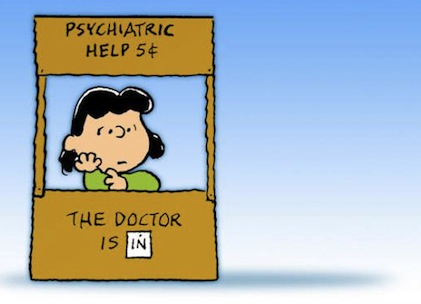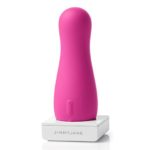
The following letter from a reader is really long. Like, really long. (And this is the abridged version!) But we’re publishing it here because we think it raises a really interesting, important question about relationships: How can you tell when you’re talking too much? And how can you tell when you need a therapist as well as just a partner to talk to?
For people who were blessed with a functional, happy childhood and/or stable mental health, the question probably doesn’t come up too often. But for people who are in therapy, or think they might need therapy, or who have come a long way in their life thanks to therapy, it’s an important question.
It’s easy to use a partner as a therapist. They’re free, for one thing! And they love you (one would hope), they have your back, and, unlike your therapist (again, one would hope), they can spoon you, too. But is there a line you shouldn’t cross when it comes to talking through problems? And how do you know where that line is? Is it a matter of content? Or is it simply a matter of how much time your partner spends listening vs talking?
Obviously, before you decide on who’s best to talk to, it’s important that you identify what is causing your mental (or physical) ailments. For example, if it’s a momentary stress, perhaps having your partner to talk to and blow off some steam on is the best option. However, if you feel that you’re suffering from a mental health disorder like depression, or perhaps you are struggling with anxiety, a qualified therapist is definitely the best option, as well as using resources online to look at symptoms of these disorders and getting diagnosed by a health professional.
Speaking to a therapist can reveal alternative methods of dealing with any stress and mental disorders. They can offer you person-centered therapy or prescribe medication that could aid with stress relief. Some therapists even prescribe medical marijuana to help you with any relief you may need. When it comes to psychological ailments, marijuana and marijuana-based products are shown to have a positive effect on mood disorders such as panic attacks, stress, anxiety, and depression. Learn more by clicking on the link.
Ultimately, the ease with which you can get a medical marijuana card depends almost entirely on where you live. For example, if you live in Canada, you will need to speak to your family doctor and they will decide whether you qualify for a medial marijuana card. If you don’t, you could always try CBD instead. CBD stands for cannabidiol and is the second most prevalent active ingredient of marijuana but it is legal to purchase it without a card. Simply search online for “cbd canada” to find the best online retailers. In America, the rules for getting a medical marijuana card differs state by state. In Ohio, for instance, medical marijuana cards are available to patients with qualifying conditions such as cancer, fibromyalgia, and glaucoma. Once you are issued a medical marijuana card, you can purchase cannabis products at any of the open dispensaries located throughout the state such as rise dispensary in Ohio.
Share your thoughts on this topic in the comments section below. Also, we highly recommend reading this letter we received, which does a great job of illuminating the way that this issue can rear its ugly head in relationships.
Dear Em & Lo,
A year ago, my first long term relationship of five years ended very badly. In retrospect, the relationship had a number of red flags early on. Both my partner and I had emotional issues due to abusive parenting. However, I now believe that my openness to explore these issues and receive therapy whilst in the relationship lead me to become the scapegoat for his problems, on top of trying to deal with my own.
Towards the end it got very bad. I was trying hard to receive more help with my emotions, with a growing sense that “everything was my fault,” an idea that was supported by my ex-partner, who would diagnose me with mental health conditions that the doctor did not agree with. My ex once showed me a letter he’d written to his dad in which he declared himself to be a “full-time carer to a partner with clinical depression.” This was a couple of years after I had got back to living life following acute OCD and depression (due to two abortions I’d had, encouraged by my ex). My doctor had just clarified that he did not feel I was suffering with clinical depression. My ex-partner was definitely not a full-time carer for me.
Since our breakup I have found such reserves of strength in myself that I didn’t know existed. I have developed some amazing friendships, the kind that were belittled by my ex, and I have just completed my second course of CBT. The therapy was aimed at food-related psychological problems, however, we ended up talking a lot about boundaries, assertiveness and my unwritten rules developed as a child in an abusive environment. I can see that many of these issues had become huge problems in my last relationship, as I had little understanding of boundaries, and experienced a great deal of anxiety and uncertainty throughout the relationship. I have been working to instil the belief that my feelings are important too, as survivors of abuse can typically learn to overlook their own feelings in order to navigate the feelings of their abusers, in order to check for signs of danger, or other people’s mood changes. This has been all been helpful, and I feel stronger, more positive and able to care for myself in a way that is new and exciting for me. The therapy ended last week, and my therapist has discharged me with a recommendation to my doctor that I would be suitable for further therapy, as we couldn’t go too deep in our sessions. She has praised me for working hard and making progress by using the sessions well, which is heart warming, as she has correctly identified how much of an important journey it is for me to work towards self-love and self-support.
Recently I decided to open myself up to dating again, and over the past two months I have been building a new romantic relationship. Early on we were very open about our emotions and history, which feels really good to me, and he has observed my need to be open and talk about how I feel in great detail. We do have a lovely time but he has explained that he feels like he is in therapy with me, and that he can’t feel as many moments of effortless joy and relaxation that he would like in a relationship. It is early on in this relationship and I feel I have been displaying an excess of hyper-vigilance because the foundations are not set. I do have anxiety about not looking after myself, ending up in an abusive dynamic and not reading signals properly, which I am beginning to regard as hyper-vigilance. This can come through in behaviours such as being hot-headed and reactionary, even though I am aiming to be calm and assertive. Talking really helps, as when I can understand little things that my partner is experiencing that affect his mood, I can relax to know that it is not my fault.
It is becoming clear to me that I would like to be with a partner who is comfortable with the level of work that I have done and will continue to actively do with myself. In my mind, this is beginning to translate as someone who has a good understanding, or experience of, self-awareness, or therapy, and is someone that is working towards their most positive self, with whatever issues they might harbour. I would like to be with someone who shares and understands my need to communicate, yet I would also like to pursue strategies for myself in how to deal with my hyper-vigilance, and to manage healthy boundary awareness, in order to minimise over-communication, emotional exhaustion and burn-out, which I feel I may be guilty of.
For the time being, I am not afraid of being alone in order to do more work on myself, however, I am also aware, since this recent relationship, that some of the work I would like to do on myself might only come up in a close intimate relationship. Right now I plan to keep loving myself, being kind, journaling thoughts and feelings, taking care of my body and continuing to apply the boundary and assertion ideas recently taught to me.
Is my dream of finding a partner who can accept me as I am unrealistic? How do I navigate the issues that I experience, and my history, with a partner? Should I seek more therapy now, or wait until I “need” it? Which kind of therapy might be best for the issues I have raised?
— Saffy
What do you think: How can you tell when you’re talking too much in a relationship? And how can you tell when you need a therapist as well as just a partner to talk to? Have you been on either side of this situation yourself? Share your thoughts in the comments section below.

















That’s a lot of letter to digest! Kudos to you for owning your own stuff and working on it as best you can.
Are there potential partners who have self-awareness and compassion? Yes. Are there potential partners who would accept you as you are? I’d say yes to this as well. Being aware of your own issues, and being able and willing to work on them is a very positive thing.
A more delicate question is this – when does talking about one’s own emotional needs and desires cross the metaphorical line from partnership to therapy? That’s a lot tougher. I’d be very interested in what your therapist would have to say about that, as they know you much more than what I can glean from your letter. You could also ask a prospective partner, who would hopefully be able to let you know if they felt like things were crossing into the “be my therapist” zone.
Another way of looking at it is this – how is your relationship, and life, doing? If things are well (and your partner is happy), then keep on going. If things aren’t going well (partner acting resentful or withdrawn, you’re struggling with boundaries or burnout, etc), then why not get help?
Extra bonus points to you for journaling, being kind, and loving and taking care of yourself.
Blessings and light to you, and my best wishes on your journey.